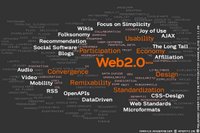WEB 2.0 Prosper: Peer-2-Peer Money Lending
 In the fall of last year, Tim O'Reilly wrote an article that quantified an emerging Internet trend, that had come to be known as Web 2.0. Web 2.0 is a neologism that denotes a new kind of Internet. In the months that followed O'reilly's article, the Web 2.0 meme has exploded. It is so popular now, that some entities use it as a buzzword for clever market-speak, the way many chemical companies will put the word "nano" on anything to increase it's mind share. This has lead to confusion, misnomers, and deliberate misdirection. So what exactly is Web 2.0?
In the fall of last year, Tim O'Reilly wrote an article that quantified an emerging Internet trend, that had come to be known as Web 2.0. Web 2.0 is a neologism that denotes a new kind of Internet. In the months that followed O'reilly's article, the Web 2.0 meme has exploded. It is so popular now, that some entities use it as a buzzword for clever market-speak, the way many chemical companies will put the word "nano" on anything to increase it's mind share. This has lead to confusion, misnomers, and deliberate misdirection. So what exactly is Web 2.0?It's a combination of both new technologies and new philosophies. The technology is a collection of Ajax, CSS, RSS feeds, etc. Anything that provides enhanced interactivity or functionality. But more important is the philosophy. Web 2.0 stops differentiating between a website and a software application. The website actually becomes the application. It puts static web pages behind us and replaces them with user driven, powerful, malleable, dynamic tools. Be they for checking your email, getting directions, writing a document, sharing photos, scheduling events, funding a start up, or making friends. Web 2.0 harnesses collective intelligence. The more active users involved with any given project, the more powerful it should become. Think Ebay feedback, Amazon reviews, or Wikipedia entries.
Web 2.0 includes blogs and wikis, social networking, user feedback, shared resources and a million kinds of collaboration. Have a look at the hundreds of Web 2.0 sites that are thriving on the world wild web. Rather than try and name and number the deluge of Web 2.0 goodness, Memepunks is going to try something a little more manageable. We are going to bring you a semi regular piece on Web 2.0. We'll either be drawing your attention to someplace on line that embodies the Web 2.0 meme, or presenting some interesting ideas of our own. As always, feel free to collaborate. if you have a particular favorite or especially useful Web 2.0 site, shoot us a Gmail or leave a comment. And we'll see about posting it here in the future. So now, without further ado, the first installment of Web 2.0 Memepunks style.
Financial institutions are as time honored as they are soulless. More people than ever are caught up in cycles of debt. Their fates are decided by a hand full of credit reporting agencies; Equifax, Experian, and Trans Union. The big three hold the keys to the kingdom, using an opaque algorithm, they have full say over your given credit score. This determines your ability to get loans or credit cards, and the interest rate on any you do get. Many credit cards have interest rates that swell dramatically after just a few months of use. For some, their credit is so high risk, that they have to operate outside of the system. They use payday loan centers. Places that advance you money for short periods of time at interest rates that would make the mafia blush. All of this often leads to people being perpetually buried under increasing mountains of debt.
There is an alternative option growing on the net. In a combination of finance and Web 2.0 sensibilities, you can now participate in Peer-to-Peer money lending. The first site to provide a P2P lending system is Prosper. P2P lending echos its Napster and Bit Torrent ancestry. When you apply for a loan from Prosper, you aren't asking for money from a particular credit company. Instead, it's other Prosper users that supply the cash. Your loan is placed in the open, like an ebay auction, and individual lenders bid on covering portions of it. If you are requesting $5000 for instance, your loan might be covered by by 100 different individuals, each bidding for fifty dollars of it. The interest rate is also arrived at as part of the bidding process. This minimizes the risk to the lenders, because the amount the front can be minimal. It also increases the chances of the borrower to get a loan. Some one is much more like to loan you $100 than $10,000. (Prosper collects 1% of the loan upfront from the borrower, and .5% from the lenders annually)
Prosper still takes into account your credit score, and your debt to income ratio. But in addition to that, both lenders and borrowers can open a dialog for questions and explanations. Perhaps the numbers say that you are unemployed, with high debt. What they don't say is that your debt is all from student loans, you just graduated from MIT, and have a 60k a year chemical engineering job lined up and waiting. All of this can be brought to the table through Prosper. The dialog also goes both ways. Lenders can call obvious trouble borrowers out on to the digital carpet in a much more open way than conventional lending institutions. Prosper even utilizes groups. Those seeking loans can try to join groups with common interests. Groups often have a good reputation for repaying loans, and that reputation reflects onto their members. However any late payments by members reflect negatively on all group members. So groups provide additional incentive and support to fulfill your obligations.
What I like about Prosper is that it moves the money out of the trillion dollar debt machine, and returns it to an exchange between people. And it does it in a way that is open, transparent, and available to all. Yet another new meme that would be next to impossible without widespread connectivity and information access. Keep in mind that Prosper may be the first horse out of the shoot, but it's not the only one in the race. More P2P lenders will be arriving on the scene soon. Wielding even more collective user power to make an end run around the existing credit systems. Idon't know which if any of them will thrive and become the next Ebay. But I'll bet real money that more than one of them will prosper. [via Boing Boing. See the BB link for the originating Salon article without the pesky day pass.]
"There is only one time in the history of each planet when its inhabitants first wire up its innumerable parts to make one large Machine. Later that Machine may run faster, but there is only one time when it is born. You and I are alive at this moment." - Kevin Kelly



2 Comments:
I liked your story, I've been a group leader on prosper since it opened. I run the apple user group http://augp.maclenders.com
whoa, the maclenders are like defaulting on their loans! haha just checked the group, that's funny.
Come on guys, wake up and pay up! They should make a youtube video about it, like the MAC versus PC ones.
Post a Comment
<< Home